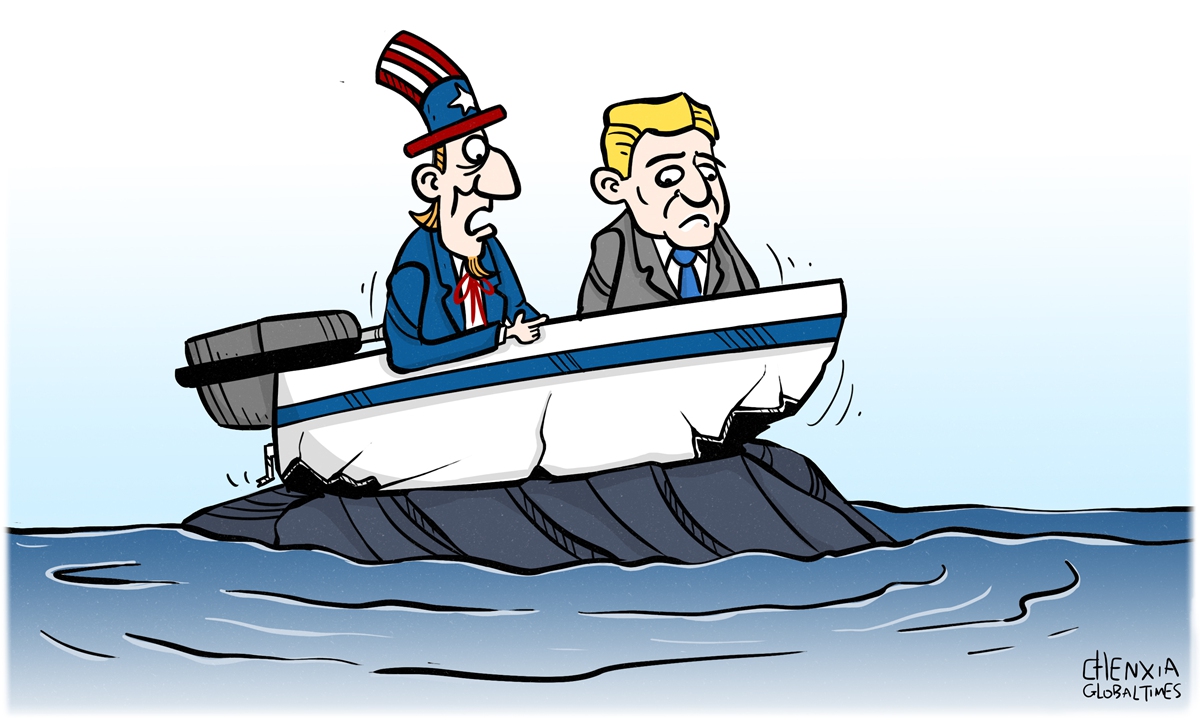
Illustration: Chen Xia/GT
French President Emmanuel Macron, during his trip to the US, staged a lovefest with his US counterpart Joe Biden. The joint statement released after their talks stressed the "longstanding" relationship between the two countries, which seems to indicate that the previous rift is no longer there. Biden has offered Macron everything presentable, making France willing to cater to the US. In the joint statement, they took on China, showing a joint stance in dealing with the "challenges" of China. Nonetheless, this cannot hide the increasing transatlantic trust crisis.
Former US president Donald Trump blindly pursued the "America First" policy, and he was also good at calculating when dealing with European allies. This once caused the Europeans to question their souls - Is the US still an ally of Europe? After Biden was elected, Europeans couldn't wait to show their loyalty to the US, and Biden declared in a high-profile manner that "America is back." However, the good times didn't last long, and the US' embarrassing retreat from Afghanistan once again caught the Europeans by awe. What's worse, the US snatched Australia's nuclear submarine order from France, and incited Australia to establish AUKUS, a trilateral security pact with the US and the UK. Europeans have been "sacrificed" by the US time and time again, making Europeans increasingly determined to build strategic independence.
However, the outbreak of the Russia-Ukraine conflict instantly wiped out the will and ability of Europeans to pursue their strategic autonomy. Europe's embrace of the US did not bring about the expected result. Rather, as the Biden administration keeps carrying out measures that only serve US interests, Europeans are beginning to doubt if the US truly takes into account their interests.
First, the US and Europe have different demands on how to deal with the Russia-Ukraine conflict. The US hopes that the conflict can be prolonged so as to drag Russia down, consolidate the security vassal status of European countries, and expand NATO membership. But for EU countries, Russia is a neighbor that cannot be moved away. Especially for major Western European countries, they still hope to reserve room for maneuver in Russia-Europe relations, and do not want the conflict to escalate out of control.
Second, on the issue of energy, the US has always regarded the North Stream pipeline as a thorn in its side, repeatedly hyping the threat of Russia weaponizing its energy, and finally succeeded in inducing a substantial "decoupling" of oil and gas resources between Europe and Russia. Europe's energy sanctions against Russia have brought about a huge backlash effect, causing Europe to fall into an energy and inflationary crisis.
Third, on the issue of trade, discussions on the possibility of a trade war between the US and Europe are increasing. The Inflation Reduction Act passed by the US gives high subsidies to American companies. Many investments in Europe will be attracted to the US. Europe is extremely dissatisfied with this trade protection measure. During his meeting with Macron, Biden acknowledged "glitches" in the law and said "tweaks" could be made to satisfy Washington's allies. However, many analysts believe there is little possibility that Washington would make such adjustments.
Finally, on the issue of China, Europe increasingly feels that it cannot keep up pace with the US. Although Europe has some common demands with the US on China-related issues, such as strengthening competition with China in the high-tech field to ensure its own leading position, Europe does not want and cannot afford the consequences of a complete "decoupling" from China. Under the lure of the US, the voice of siding with the US to contain China in Europe has once again became louder. However, as the US only uses Europe to suppress China and forces European companies to choose sides, there are obvious differences within Europe on the issue of being tough on China and maintaining engagement . Recently, leaders of EU institutions and some member states have visited China or expressed their willingness to visit China, which shows that Europe recognizes that China-EU relations cannot be allowed to continue to decline.
Europeans are prompted to realize that in order to maintain its hegemony and solve domestic problems, the US will continue its economic isolation policy. Europe will only be exploited, and the interests of Europe will be sacrificed in the end.
In the past, the Europeans often deluded themselves, imagining that the US will change its mind one day. It is very likely that many Europeans still have this mentality even today. However, they will wake up sooner or later. The "America First" policy endorsed by Washington will only be further strengthened in the future.
The author is director of the German Studies Centre at Tongji University. opinion@globaltimes.com.cn




